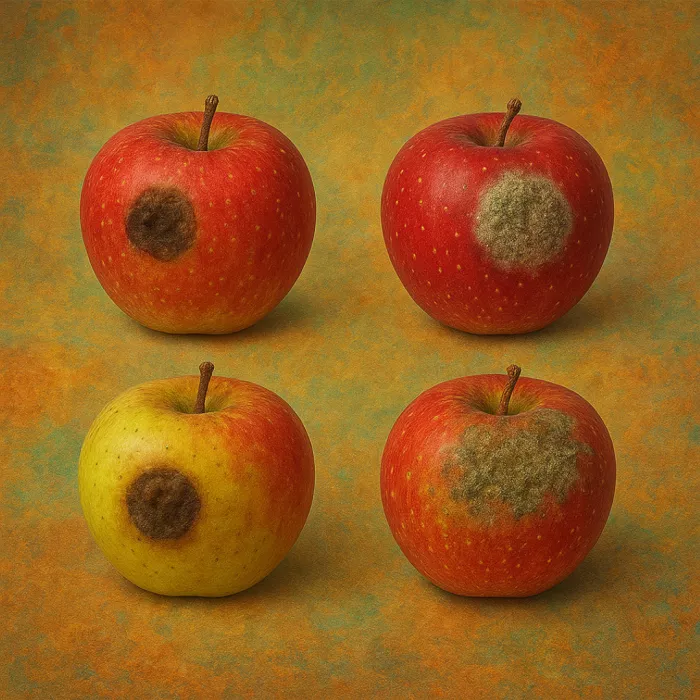
Apple fungal diseases: old and new enemies

Abstract
Apple is an economically important fruit crop, highly appreciated by consumers and generally cultivated in humid climatic conditions, prevalent in Northern Europe and very important in Northern Italy. Pre and postharvest diseases of apple determine significant economic losses in the field and during storage. Among the postharvest pathogens, Neofabraea vagabunda, the causal agent of bull’s eye rot symptoms in pome fruits, represents one of the most challenging threats to postharvest management. Neofabraea can infect fruits from petal fall to harvest time, with susceptibility gradually increasing during fruit ripening. However, bull’s eye rot symptoms only manifest at the postharvest stage. Neverthless, considerable variation between and within fungal strains in the hosts colonization as well as the mycelial growth and sporulation, often connected to the optimal temperature, water activity (aw) and the biochemical composition of the substrate should be always considered Furthermore, in the last years well-known postharvest pathogens, belonging to Colletotrichum spp., causal agents of apple bitter rot, have become pre harvest issues in all the northern part of Italy. In fact, Colletotrichum spp. can cause on apple two distinct diseases, Apple bitter rot (ABR) and Glomerella leaf spot (GLS), that differ, but also overlap in their epidemiological characteristics. For all these reasons, two populations of N. vagabunda and Colletotrichum spp. strains, currently found in Friuli Venezia Giulia Region, were characterized and analyzed by in vitro and in vivo assays, with the aim of shedding light on aspects that are still little known about both pathogens, which are so different yet still so prevalent in Northern Italy.
The speaker
Prof. Alessandra Di Francesco obtained her Master's degree in 'Sustainable Management of AgroEcological Systems' at the University of Perugia (Italy) in 2011. She completed her Ph.D. in Plant Pathology in 2015 at Bologna University with the thesis ‘Aureobasidium pullulans as biological control agent: modes of action’, and she was a postdoc until 2021. Alessandra has 13 years of experience in academic research in plant pathology, postharvest diseases, and biological control methods, gaining experience in these sectors. In particular, she is specialized in Biological Control of pre- and postharvest fruit and vegetable fungal diseases, determining innovative solutions for sustainable productions and for reducing foodstuff contamination. In these years, she studied the use of biocontrol agents (BCAs), mainly Aureobasidium pullulans isolates, in order to verify their effectiveness against different fungal pathogens (fruit and soil) and their ability to promote plant growth. Recently, she was P.I. of a PRIN Project – PREST.APPLE and of a PNRR Project Inest YRC- Young Researcher. Also, she is WP manager of the European project Biodiversa+ - WildCrop together with SLU- Swedish University of Agricultural Sciences (coordinator) and University of Malaga. She is the author of 57 indexed publications, three book chapters, and an oral speaker at national and international conferences. She was an invited speaker at ‘Plants in Changing Environment Conference’ (Ljubljana, September 15- 16, 2022) and at Fungal Genetics24 Conference, Asilomar- Conference Grounds Pacific Grove, California. Alessandra realized two patents on the application of Aureobasidium pullulans in mushroom farms to control green mold diseases and in the chips production chain. This series of seminars has been organized for PhD students, post-docs and researchers of the Center Agriculture Food Environment and Edmund Mach Foundation. Your participation is warmly recommended! Mark it down on your calendar! to reduce acrylamide content. In 2021, she was awarded with DAAD (Deutscher Akademischer Austauschdienst) grant to carry out a project on biochemical characterization of natural compounds (antifungal and/or plant bio stimulant) produced by Aureobasidium pullulans strains at Eberhard Karls University of Tübingen (Germany). Alessandra started in 2022 to work as a senior researcher (rtd_B) at Udine University, studying alternative, environmentally friendly methodologies and bioformulations to control the principal fungal plant pathogens. In her mycology Lab at Udine University, she is isolating new Aureobasidium spp. strains from different habitats and during different times of the year, with the aim to verify their effectiveness as biocontrol agents (BCAs) at different environmental conditions, opening up new possibilities for commercial bioformulations. One of her research objectives is to study emerging and re-emerging pathogens of apples, with particular emphasis on latent infections. Actually, she is a tutor of 2 PhD students, and a supervisor of a research fellow. At Udine University, she teaches the courses ‘Biological control of plant diseases’, ‘Grapevine Pathology’, ‘Mycotoxins and Biocontaminants’, and ‘Food Protection’.